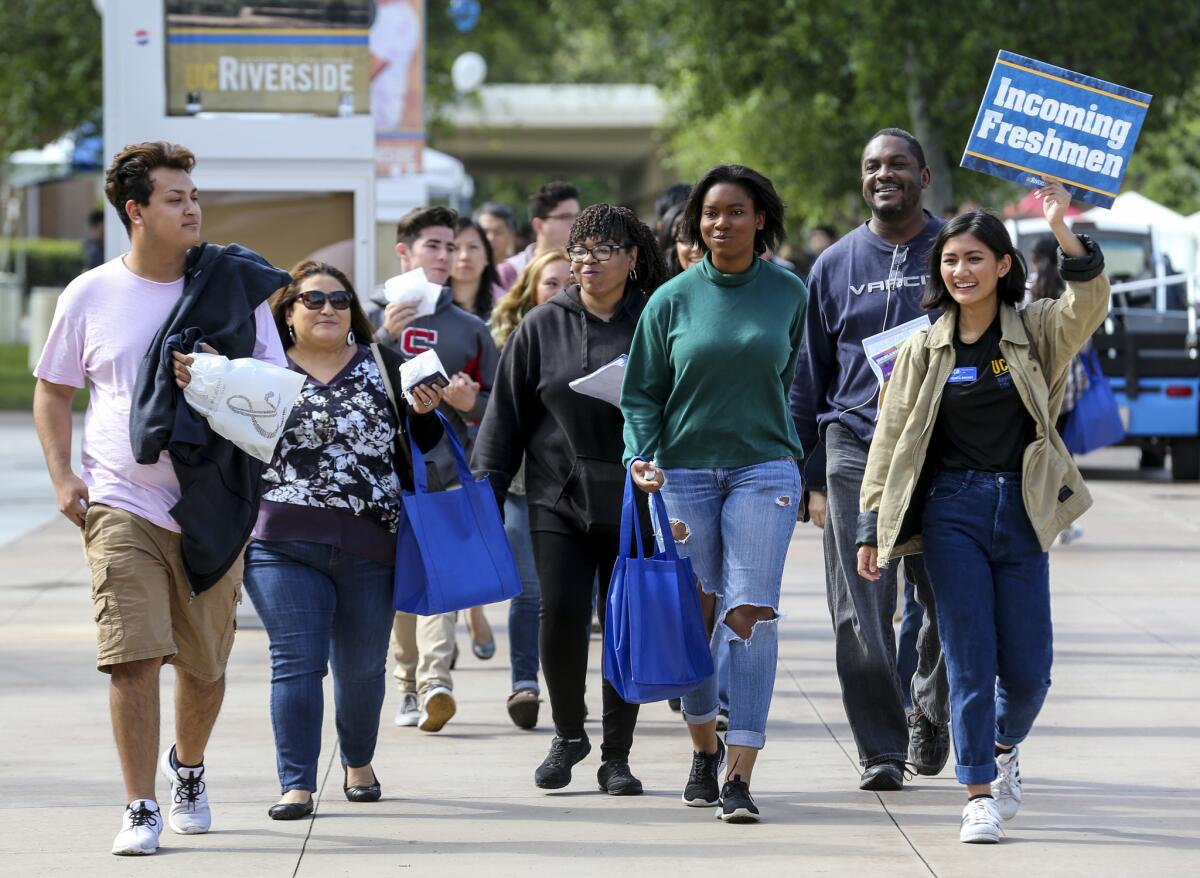Dropping the SATs could make UC admissions more biased

- Share via
The University of California’s faculty leaders, after a yearlong review, have recommended keeping the SAT and ACT in UC admissions. Yes, there have long been concerns that test scores are influenced by family income, parents’ education and race. But the faculty task force found that the UC system has been able to offset such bias by including other relevant factors in admissions.
I believe that as a practical matter, eliminating the tests could make inequities worse. Doing so would mean relying more heavily on other measures that are equally biased or more so, like high school grades.
Grading standards vary greatly across California. Research by the Fordham Institute indicates that there has been more grade inflation in recent years at affluent high schools than those serving lower-income students, thus creating a wider GPA gap. This finding has been cited as showing that grade inflation can lead to a bias problem in admissions as well.
But we’re unlikely to give up GPAs as a factor in admissions decisions, since they are the only quantitative tool in the process, besides standardized tests. Dropping the tests would give more weight to grades – further increasing grade inflation pressures at affluent schools and drive wealthier families to hire tutors to help their students get better marks. How would that help reduce socioeconomic discrimination?
Similar bias exists in other admissions criteria as well, like performance in Advanced Placement and honors courses, class ranking, extracurricular activities, interests and skills. Many of these measures, to a large degree, reflect the availability of family and school resources, which low-income students don’t have. And yet, these tools would still be used even if we stopped using the SATs.
The fact is, an admissions process that seeks to find talented, motivated students from all backgrounds has to be cognizant of biases in all assessment tools and compensate for them.
At UC Riverside, we have learned how to mitigate the bias of SATs so that we aren’t screening out good candidates who should be admitted and can succeed here. We have found that students who entered UC Riverside with high grades but lower SAT scores graduated at almost the same rate as students with high grades and high SATs.
In the admissions process, UC Riverside affords specific weight to both first-generation and low-income students, which has been a key element of Riverside’s success.
UC Riverside isn’t alone in making efforts to offset test bias. All the UC campuses “re-norm” the SATs to evaluate an application in the context of the student’s high school and neighborhood, allowing admissions officers to find standouts among students of similar backgrounds. The faculty review found it was very rare for otherwise qualified students to be turned down based only on test scores. Of the 120,000 California applicants to the UC system for fall 2018, fewer than 50 students with strong grades and low scores were denied admission.
The faculty task force also found that test scores are a better predictor of college performance than high school grades, even though UCs increasingly give more weight to grades. Systemwide, standardized tests are better predictors of first-year college grade-point averages than high school GPAs. This is reflected in our own numbers at UC Riverside.
Beyond reducing admissions bias, our top priority is to ensure that disadvantaged students succeed. A careful admissions process is really only the first step. The next is providing support to students as soon as they arrive. After they enroll, all students have access to structured academic help, counseling, and career services, as well as peer mentors and programs for first-year students.
It’s working. Over the last six years, our six-year graduation rate has climbed 10 percentage points to 76%. This last year, UC Riverside was ranked the No. 1 college in the nation by U.S. News & World Report for graduating low-income students. Our low-income, first-generation and minority students graduate at almost the same rates as all other students, 74% to 77%.
Admissions tools are only as good as how we use them, being aware of their limitations. Until we can develop better measures, keep the SATs in the mix. But recognize that the success of an admission process is best determined by how students succeed in their college experience.
Kim A. Wilcox is the chancellor at UC Riverside.
More to Read
A cure for the common opinion
Get thought-provoking perspectives with our weekly newsletter.
You may occasionally receive promotional content from the Los Angeles Times.









